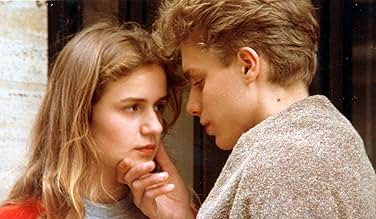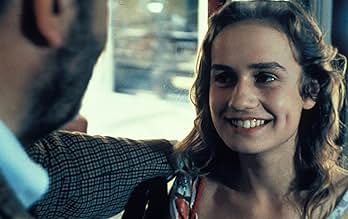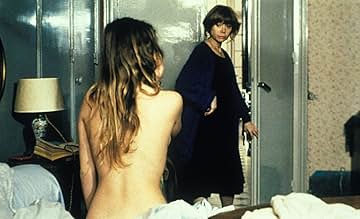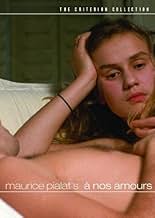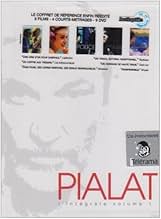À nos amours
- 1983
- Tous publics
- 1h 39min
NOTE IMDb
7,1/10
7,5 k
MA NOTE
La famille d'une jeune fille fantasque cherche désespérément à la garder de ses penchants de plus en plus érotiques.La famille d'une jeune fille fantasque cherche désespérément à la garder de ses penchants de plus en plus érotiques.La famille d'une jeune fille fantasque cherche désespérément à la garder de ses penchants de plus en plus érotiques.
- Réalisation
- Scénario
- Casting principal
- Récompenses
- 4 victoires et 3 nominations au total
Avis à la une
Being so restrained, blunt and straightforward, Pialat's film is also enormously touching. The concreteness of the world he creates here is tangible. Psychological realism true in each detail, and as ensemble. The brutal restraint is somehow disconcertingbeing given the bad habits inflicted by the standard psychology of most other films. Pialat's project was a naturalist one, hence the impression of a thing just begun, just started, still in progress. (It would be, anyway, absurd and stupid to try reducing Pialat's implicit aesthetics to some theoretical statements and criticism's clichés.) What is obvious is that Pialat achieved his aimfinding the fourth dimension of this coming of age story. For me,Pialat might not be worthy of love; he is certainly worthy of respect. In his moviesnot only in this one, but in several others as wellone finds not only probitybut also genuine power, inspiration, the strength of a secret master, Pialat. Good and serious director, keen psychologist, avid of femme's perfume and scent, intelligent and uncompromising.
In psychology, Pialat rightly perceived the distances and the gaps and ,as it were, the laws of the perspective. In this movie, Pialat uses this sensational and hidden knowledge to tell the tribulations of a gamine.
The amazing lead actress is worth seeing; with her, the film took one more chance at the ineffable.
Any movie is made with elements,but it lives out of the rapports and the ideas.On the cinematographic elements' level,Pialat's movie is austere.There is no bit of stylization,but each element has a 4th. dimension:the rapports' level.This dimension is widened by the music.Purcell's suitable music gives the action a strange coherence.The movie is made out of relations,rapports,reflections.Far from being some kind of a flat realism,Pialat's movie lives entirely out of this wealth of thought.
Most important,this strengthener,firm,intelligent,bitter,even poignant realism is not fake.
A courageous decision is the refusal of all stylization.(The "cruel movie",the ferocious movie relies on stylization.)True realism means ideas,reflection,a lively mind.Far from being mechanical and passive,it is fertile and elastic.
This movie is also a medicament.
I find it disappointing that only 3 comments were written here for "À nos amours ".Also,the weighted average vote of 7.5 / 10 is unfair.
Miss Bonnaire is a standout.Her cinema presence in "A Nos ..." surrounds the viewer.
In psychology, Pialat rightly perceived the distances and the gaps and ,as it were, the laws of the perspective. In this movie, Pialat uses this sensational and hidden knowledge to tell the tribulations of a gamine.
The amazing lead actress is worth seeing; with her, the film took one more chance at the ineffable.
Any movie is made with elements,but it lives out of the rapports and the ideas.On the cinematographic elements' level,Pialat's movie is austere.There is no bit of stylization,but each element has a 4th. dimension:the rapports' level.This dimension is widened by the music.Purcell's suitable music gives the action a strange coherence.The movie is made out of relations,rapports,reflections.Far from being some kind of a flat realism,Pialat's movie lives entirely out of this wealth of thought.
Most important,this strengthener,firm,intelligent,bitter,even poignant realism is not fake.
A courageous decision is the refusal of all stylization.(The "cruel movie",the ferocious movie relies on stylization.)True realism means ideas,reflection,a lively mind.Far from being mechanical and passive,it is fertile and elastic.
This movie is also a medicament.
I find it disappointing that only 3 comments were written here for "À nos amours ".Also,the weighted average vote of 7.5 / 10 is unfair.
Miss Bonnaire is a standout.Her cinema presence in "A Nos ..." surrounds the viewer.
"The only time I'm happy is when I'm with a guy," says Suzanne, (Sandrine Bonnaire) a promiscuous and directionless teenager. Suzanne's parents are splitting up; her brother beats her as a disciplinary gesture in her father's absence; and her mother has control over nothing. Suzanne hangs out with her friends; sleeps with anyone she is attracted to (except the boy that loves her); and returns home for knock down, drag out fights with her older brother and mother. The last 30 minutes of the film skips quickly into Suzanne's life after marriage and jumps yet again to her life after divorce. The only person Suzanne loves is her father; perhaps because he is the only person who understands and unconditionally loves her. Fine direction from Maurice Pialat who also plays Suzanne's father. Excellent acting from most of the cast saves a somewhat meandering and overwrought script.
A perfect example which illustrates why being truth to life sometimes doesn't often equal great movies. Maurice Pialat wasn't completely truthful in its depiction of youth's shallowness but he isn't completely off mark, just a few objectionable things that look bizarre, too exploitative or unbelievable. But that's life sometimes. "À Nos Amours" ("To Our Loves") focus is a teenage girl (Sandrine Bonnaire) and the way she conducts her sexual relationships, first with a boyfriend, the good hearted Luc (Cyr Boitard), and later evolves to sometimes mindless, sometimes affectionate casual encounters with other guys. Almost fine if it wasn't for her family bothering with this, and a somewhat unpredictable disintegration when her father (Pialat) decides to leave the family. What spirals after that is an emotional roller-coaster with the infatuated girl being a victim of constant reprehension and beatings from her older brother, now head of the family, and the mother who seems to be rotting away into madness, not knowing how to cope with everything happening around her. And there's plenty of time for her dedicate some time with her lovers, miserable for not getting the love she deserves.
One goes through this with plenty of expectations and interest but one walks out with plenty of reservations and little gain. C'mon, this was made in 1980's and you're telling me that even back then, in such a bourgeoisie family, allegedly cultured, they treat the typical adolescent behavior in that horrid way? With punches, yells and stuff? I would expect this in a poorer background. Everything's so over-the-top, so forced, very off-putting. The movie seems to suggest that there's something going on between father and daughter and also between brother and sister, just suggest some incestuous relations but never goes into that deep.
What Pialat captured with some excellency was youth's boredom, trying everything to escape from the usual routine of schools, classmates, and dealing with parents; youth's incapacity to love or find love, or using such as something to pass the time, not knowing what love truly means, going from one relationship to another, desperate to find something new that may cure them from their boredom and apathy towards life. This is clearly evidenced in the scene where the girl has an one night stand with an English sailor. She had her fun, experienced something great but she doesn't show much after the fact, a little worried because she cheated on her boyfriend. It isn't a first rate portrayal, obviously, but it's far more realistic than the other topics already mentioned (the family matters). The movie strangely went absurd towards the ending, giving unexplainable solutions and the strange return of the father.
I enjoyed this movie, enjoyed its good pace, it makes you interested with the very few it has to share. A little saddening that it wasn't all that much of a good film as a Cesar Award winner should be. Bonnaire, in one of her earliest roles, has plenty of qualities despite the relative lack of expression her character has, constantly down, sad, beaten. Far from being the great French cinema but beautiful to look at. 6/10
One goes through this with plenty of expectations and interest but one walks out with plenty of reservations and little gain. C'mon, this was made in 1980's and you're telling me that even back then, in such a bourgeoisie family, allegedly cultured, they treat the typical adolescent behavior in that horrid way? With punches, yells and stuff? I would expect this in a poorer background. Everything's so over-the-top, so forced, very off-putting. The movie seems to suggest that there's something going on between father and daughter and also between brother and sister, just suggest some incestuous relations but never goes into that deep.
What Pialat captured with some excellency was youth's boredom, trying everything to escape from the usual routine of schools, classmates, and dealing with parents; youth's incapacity to love or find love, or using such as something to pass the time, not knowing what love truly means, going from one relationship to another, desperate to find something new that may cure them from their boredom and apathy towards life. This is clearly evidenced in the scene where the girl has an one night stand with an English sailor. She had her fun, experienced something great but she doesn't show much after the fact, a little worried because she cheated on her boyfriend. It isn't a first rate portrayal, obviously, but it's far more realistic than the other topics already mentioned (the family matters). The movie strangely went absurd towards the ending, giving unexplainable solutions and the strange return of the father.
I enjoyed this movie, enjoyed its good pace, it makes you interested with the very few it has to share. A little saddening that it wasn't all that much of a good film as a Cesar Award winner should be. Bonnaire, in one of her earliest roles, has plenty of qualities despite the relative lack of expression her character has, constantly down, sad, beaten. Far from being the great French cinema but beautiful to look at. 6/10
France dubbed this the best film of 1983, and named the love Sandrine Bonnaire, in her first credited role, as it's most promising actress for that year. It is easy to see why as she was a joy to watch as she flitted from bed to bed trying to find happiness. I am sure there are many who will shirk at the thought of admiring the 15-year-old's body.
Those not in the loop on French films will not appreciate the style and grace of her life as she deals with a family that fights all the time, and can only find an outlet for emotions in the arms of willing lovers. But, she avoids the one who loves her Luc (Cyr Boitard), treating him like dirt when he says he loves her.
Excellent film with great performances by Maurice Pialat as the father and Evelyne Ker as the mother, as well as a knockout job by Bonnaire.
Those not in the loop on French films will not appreciate the style and grace of her life as she deals with a family that fights all the time, and can only find an outlet for emotions in the arms of willing lovers. But, she avoids the one who loves her Luc (Cyr Boitard), treating him like dirt when he says he loves her.
Excellent film with great performances by Maurice Pialat as the father and Evelyne Ker as the mother, as well as a knockout job by Bonnaire.
This is the story of a teenage French girl (Sandrine Bonnaire) with a difficult home life. Both her father (who abandons the family) and her older brother (who regularly physically assaults her) seem to have an unnatural interest in her sexuality, while her mother (who may the worst of them all) is a raving hysteric who eggs everyone else on. Not surprisingly, the girl is quite promiscuous, availing herself of any number of boys and men. In an American movie like this, her male paramours would at best be panting dogs and at worst villainous cads taking advantage of a vulnerable girl, but here they're probably the most sympathetic people in the movie!
The young girl is not unsympathetic by any means, but she simply refuses to be a victim and remains firmly in control, and no family member or lover ultimately seems to have much chance against her. She is similar to the kind of "feminist lolitas" that often appear in Catherine Breillat movies like "A Real Young Girl" and "36 Fillete"-- teen girls that are very desirable, but also wise beyond their years and in perfect control of their own sexuality, and thus never simply mere sex objects. It's surprising Bonnaire never worked directly with Breillat because she is a much more self-assured and commanding actress than any of the ones Breillat did work with. I don't know if I believe the IMDb dates regarding Bonnaire's age as her assured acting (and her nude body) suggest that she was somewhat older than the character she's playing here, but she's very impressive regardless. Interestingly, while she became a very formidable actress in her later years (especially in films like Claude Chabrol's "Initiation"), she would not really be one of your more glamorous and sexy French actress. She certainly compares well to her contemporaries at the time like Emmanuelle Beart and Sophie Marceau, but while they would become leading ladies, she stayed more of a character actress.
Ironically, the one problem I had with the movie is that Bonnaire and her character is perhaps TOO self-assured and as an actress Bonnaire tends to dominate the rest of the cast too much. It might be a feminist statement to have young female protagonist who is this self-confident, but I don't know that it's necessarily very realistic.
The young girl is not unsympathetic by any means, but she simply refuses to be a victim and remains firmly in control, and no family member or lover ultimately seems to have much chance against her. She is similar to the kind of "feminist lolitas" that often appear in Catherine Breillat movies like "A Real Young Girl" and "36 Fillete"-- teen girls that are very desirable, but also wise beyond their years and in perfect control of their own sexuality, and thus never simply mere sex objects. It's surprising Bonnaire never worked directly with Breillat because she is a much more self-assured and commanding actress than any of the ones Breillat did work with. I don't know if I believe the IMDb dates regarding Bonnaire's age as her assured acting (and her nude body) suggest that she was somewhat older than the character she's playing here, but she's very impressive regardless. Interestingly, while she became a very formidable actress in her later years (especially in films like Claude Chabrol's "Initiation"), she would not really be one of your more glamorous and sexy French actress. She certainly compares well to her contemporaries at the time like Emmanuelle Beart and Sophie Marceau, but while they would become leading ladies, she stayed more of a character actress.
Ironically, the one problem I had with the movie is that Bonnaire and her character is perhaps TOO self-assured and as an actress Bonnaire tends to dominate the rest of the cast too much. It might be a feminist statement to have young female protagonist who is this self-confident, but I don't know that it's necessarily very realistic.
Le saviez-vous
- AnecdotesIn the original script, the father was due to die and was not scheduled to return at the time of the dinner scene. Maurice Pialat walked into the scene and left the actors to improvise in a situation they hadn't planned for.
- GaffesIn the sequence with the American, Suzanne's outfit changes from a one-shoulder black dress with white stripes trimming just the top of the bodice, to a one-shoulder black&white striped top with a black skirt, and back again.
- ConnexionsFeatured in Sebastian (2024)
Meilleurs choix
Connectez-vous pour évaluer et suivre la liste de favoris afin de recevoir des recommandations personnalisées
- How long is To Our Loves?Alimenté par Alexa
Détails
- Date de sortie
- Pays d’origine
- Site officiel
- Langues
- Aussi connu sous le nom de
- Les Filles du Faubourg
- Lieux de tournage
- Cité Bergère, Paris 9, Paris, France(Suzanne and Jean-Pierre looking for a hotel)
- Sociétés de production
- Voir plus de crédits d'entreprise sur IMDbPro
Box-office
- Montant brut mondial
- 2 575 $US
Contribuer à cette page
Suggérer une modification ou ajouter du contenu manquant



